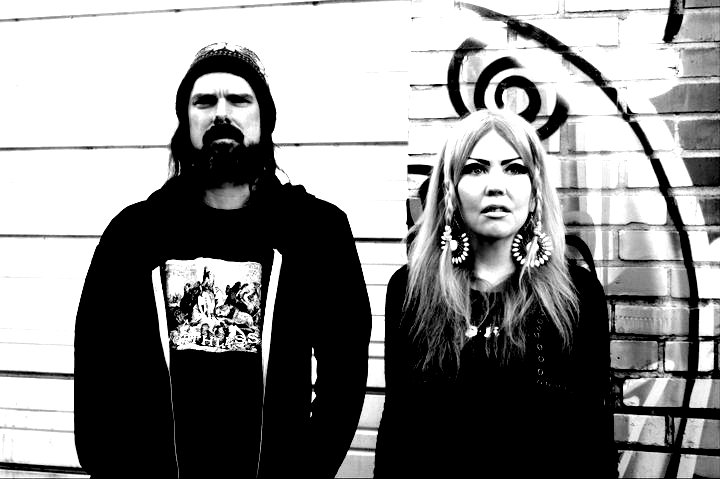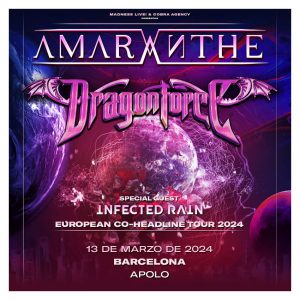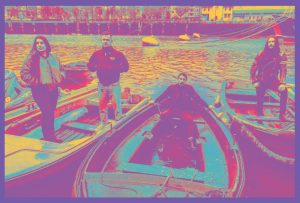JUCIFER (Eng.)
– Hello, lots of thanks for answering our interview. How is everything going into the JUCIFER’s camp right now?
Thank you! Everything’s good, I’m answering this from a train crossing the south of Russia haha. A little bit bouncy but we’re lucky the weather is not too hot or cold.
– This year you are celebrating the band’s 20th anniversary so, first off, what balance could you now do out of all these years of musical career?
It’s strange to mark 20 years because we still feel life as just a daily process, and the same for the band. We’re always looking ahead to what’s next. But I can say being at this 20 year point has made us stop at least a little to notice what we’ve accomplished, and it feels really good.
– You recently released your newest album, entitled «За Bолгой для нас земли нет». How has its feedback been thus far? After the good response your previous «Throned in Blood» got; did you work under more pressure this time around?
Feedback for the album has been amazing. We always make sure that we ourselves are satisfied by each album before releasing it, but of course we can never know how other people will accept it until it’s out. It seems with this record the response of others is very similar to our own feelings; a powerful, emotional experience and a very heavy album. We didn’t feel any more pressure than usual after ‘Throned’ just because we’re always perfectionists… we put the highest pressure on ourselves all the time regardless of expectations anyone else might have, haha!
– I guess you may be tired of answering to this but, how did you choose that title and what does it mean?
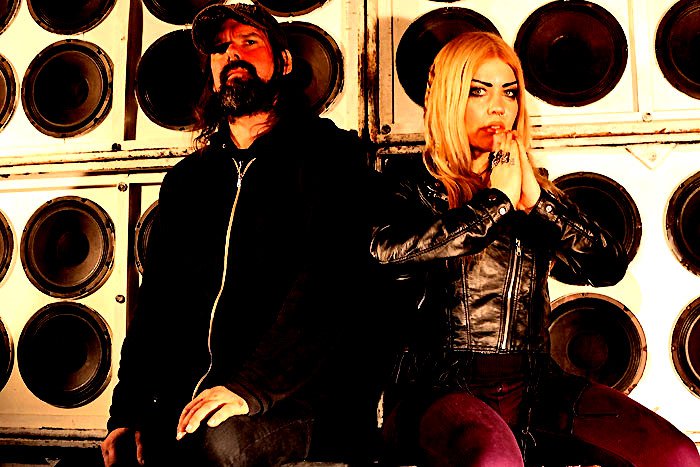
We chose the title because it was a rallying cry of Stalingrad’s citizens during their historic battle. It was believed to be said by the battle’s most famous Russian hero sniper, Vasily Zaitsev. The English translation is roughly “There is no land for us beyond the Volga”. The Volga river is where the city that was Stalingrad, formerly Tsaritsyn, now Volgograd stands. During the Battle of Stalingrad — one of the bloodiest in all known history — these words expressed the fact that if this city was lost, fascist invasion would spread into Russia and probably spell the end of their culture and way of life. Our album is about the battle not as a military event but as sort of a microcosm of Russian strength and endurance. We were fascinated not only by the citizen heroes of this crucial fight but also the history and power of the land itself… its own endurance and quality of being both difficult to inhabit and rewarding to those with will to try. I think it resonates especially with us as our own lives, being nomadic musicians in a form of underground music which isn’t prosperous financially, are similarly hard but rewarding. The idea that with belief and courage one can win against enormous odds is something close to our own hearts.
– It’s a quite fitting name for the concept behind this opus so, would you mind to elaborate a bit on what does it deal with and why did you decide to go for this theme?
We’ve both been interested in all history and especially Russian history since we were children. We’re old enough that when we were small, the U.S. and Russia were still enemies. It was still the Cold War. Both of us were rebellious enough that of course, Russia as a forbidden place was naturally very attractive to us! As a band we’ve always made music as soundtracks to stories. Some of our records have been stories about an individual, others about an era or a specific event from history. Having such a fascination with Russia, we knew eventually we’d make at least one Russian-themed album. I feel like there will be another later, because Russia is so huge and its history really immense! But for now we felt the time was right to do this one.
– If I’m not mistaken you recorded the album in different cities and countries so, would you mind to elaborate a bit on how did this whole process go? Basically you mastered and mixed it while on tour, I guess it may have been a bit challenging for you…
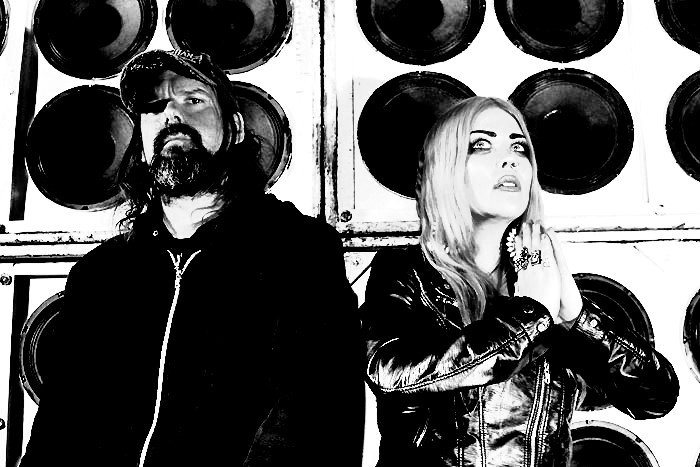
For a band that’s touring all year long for the past thirteen years (and presently) it is a real challenge to plan studio sessions. We have to schedule time off in a place where the studio is available, so it has to be planned months ahead. Then if we don’t have time to finish the studio work during our initial session, we have to wait months for another session often in a different place. So that’s how this album wound up being recorded in five cities, three countries and two different continents haha! We began the record in Canada in late June 2011, just after returning from our first tour in Russia. Within 9 days we didn’t finish all tracking, so we made plans to return to the same Canadian studio. Then just as we were going to return, the studio had to move locations and we weren’t able to record. We continued on tour for several more months not knowing when we could finish the album, until finally we were able to do another session in Arkansas in 2012. We then had to wait again until beginning of 2013 at a studio in Pennsylvania to do a last couple of vocal tracks and all of our mixing… the mixing couldn’t be finished during the time we had booked, so we were still doing that up to the last minute this June… sending songs via internet and emailing changes we wanted to the engineer! Meanwhile our friends in Volgograd, Russia recorded the Russian narration which we’d written in English and they translated, and they captured with portable recorder the ambient sounds of the modern city we wanted, which brings the listener up to 2013 as the album closes. Then we mastered the record also via internet, with a guy in Portland, Oregon. It was a really chaotic way to do things! But in the end we managed to get the record really just as we’d envisioned it, which is pretty miraculous.
– If I’m not mistaken on previous albums you used some old songs, but on your new record all of them are now. Could you say your fans could actually notice this when listening to the album? How different are the current JUCIFER to the JUCIFER that wrote some of those old songs featured on previous releases?
On our earlier albums we always included a few songs which were really incredibly old. Both of us were writing as far back as the 80’s; so for example ‘Pontius of Palia’ was written by Edgar around 1988, though it first was released in 2006! We always used these old songs when they suited the story of an album, because we liked them and thought they were worth having documented. But of course our oldest songs as individuals came from a time when we didn’t have an audience or even a band. They’re simple. Stuff we played in our respective rooms at home, you know? They are cool songs, but as compared to anything we’re writing now, it’s like maybe the difference between riding your tricycle as a child and driving a sports car later on. If I look back at our albums, there are always some of these old songs alongside more sophisticated or at least current, adult-written songs we were actually playing. The current Jucifer is very different from those 80’s songs we sprinkled into the albums, but not so different from what we’ve always been since being a band… though better, we hope, after 20 years haha!
– You have always had a recognizable sound, but never done the same album twice. Is this something you keep in mind or do you just let things flow naturally?
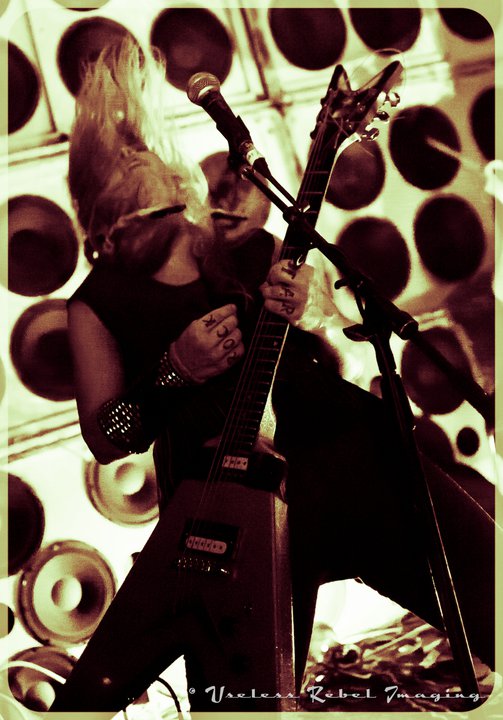
We would be really bored making the same album twice. So it’s really natural for us to keep doing things differently each time. Yet we have a certain taste, which I think is why even as our songs might veer from folk to grind or whatever, we still can be recognized. As far as any kind of agenda for each album, it’s only to tell the story we’ve chosen to tell in the way that feels most true and effective. Our albums aren’t a documentation of our band’s development, like most bands’ albums are. They’re each just a story we wanted to tell, something that inspired us and we felt we needed to exorcise. This is a funny way to make records, we know, since usually bands make records to market themselves! But we’re just into doing music in the way that pleases us, even if it makes us harder to understand. In the end we want just to be happy with both our albums and our shows. We’ve found our own weird way to do that.
– All this about «За Bолгой для нас земли нет» being said; how could you describe it in just 3 words?
‘Ни шагу назад!’ (translates, “not a step back”)
– You are present on social media, which in the recent years have made easier doing promo as well as interacting with bands fans. How important do you think are social networks for any band?
I’m not sure how much, if at all, social media affects bands’ popularity or traditional measures of success. But for us it’s just cool to connect with fans and also with other interesting people whether music people or completely unrelated. I spend less time advertising Jucifer and more time just talking about things that interest me when I’m on social media. It’s especially cool for us as we’re always traveling and working hard and rarely get to sit down to converse with people besides each other. So on social media we can have those interesting conversations about politics, current events or whatever else we’re into.
– In fact when you started there were no tools as Twitter for instance, and Internet in general has had a huge impact on the music scene but, do you think has Internet been a benefit for it or rather the opposite?
Internet has been an amazing tool for a touring band as far as GPS, google maps, stuff like that which enables travel. Touring overseas is much more possible because everyone can communicate by email. As far as how it’s changed the way music is heard and the way bands are understood, I think it can be positive but also very negative. On the plus side, it’s easy for people to discover bands. But familiarity breeds contempt, as they say. Older people all seem to agree that we had more commitment to bands in pre-internet days because you had to invest more in order to hear them; both money and time. Discovering a band was like magic, whereas now I think there’s a realistic perception that there are millions of bands… and because of that listeners have little patience. Music is quickly consumed and thrown away. Back in the day you’d buy a record because you thought it might be cool. And you’d listen to it over and over, finding reasons to enjoy it. Now people listen to maybe 10 seconds of one song and decide if they like the band or not. Which I think is a loss both to bands and to listeners, because with any interesting band, you can’t judge them based on 10 seconds, one whole song or even one album. That said, internet is here and this is the way people live now. We just keep doing what we believe is best, musically, and are glad for all the support we have. In the post-music-industry present, where there’s hardly any money coming to bands for their music, it’s the fans who support shows and buy albums they could just get free from torrent sites who keep music alive, especially underground music. And we appreciate them so much!
– As you may know, from Queens of Steel we have always brought special support and promotion to women into the Metal scene, so I can’t actually help asking you a couple of things in concern. First of all, could you say there’s discrimination into the Metal world? As even though many people respect and admire female Metal musicians doing their own thing, into the Metal world people tend to illustrate differences between both genres instead of highlighting similarities.
There’s a lot of discrimination still present in modern culture, even in the countries which consider themselves most liberated or civilized. Of course this reaches into all corners of society, including the metal world. The idea of “girlfriend metal”, for example… as if girls have to like only softer or shittier metal. Really ludicrous stuff but popular among guys who are freaked out by strong females, I guess. The unfortunate truth is that people will judge you differently based on your gender. I don’t approach the world as a “female vocalist” a “female guitarist” or the awful, to me “female fronted band”… but the world sometimes approaches me as such. I can only continue knowing that I’m as capable as anyone, male or female, and doing what feels good to me. If it scares or upsets someone who thinks I’ve stepped “out of place” that’s too bad. I don’t have any empathy for sexism, racism etcetera. But if people need that stuff to feel more secure or important, I don’t suppose I can change their minds. I just know it’s silly.
– And are there any female artists that have influenced you both as vocalist, composer and guitar player?
I was influenced early on by a lot of guys, because I was naturally drawn to a lot of really heavy music and I didn’t find women doing it back then. But a few women I thought were amazing were Tina Turner, Janis Joplin, the Wilson sisters from Heart, Patti Smith, Dolly Parton, Loretta Lynn and Debbie Harry. I was a little girl in the 70’s, so these were women who were strong and well-known in that time. When I found punk and metal it was all guys, and so male bands in those genres had more influence on me than anything similar that women might have been doing in the early 80’s. It was just because of how I found stuff — pre internet, haha! In 1982 or 83 I started to play guitar and write my own songs, and after that I didn’t pay as much attention to other people’s music. I’ve stayed that way ever since… just more focused inward, making sounds I want to hear. I think a lot more females entered heavy music over the last two decades and probably are doing a lot of cool stuff, but I just don’t expose myself to other people’s music much. I like to keep my influence more from within and from the stuff which inspires me, that is history and literature and life rather than bands.
– And finally, what are your near-future plans?
We’re touring in Russia now and then will be touring Europe through November. A few shows before the end of the year in the U.S., and then we’ll be on to the next year of touring!
– That’s all, thank you once more for answering our questions. If you want to add some final words; feel free to do it.
Thank you very much for the great interview and I hope to meet you soon.
